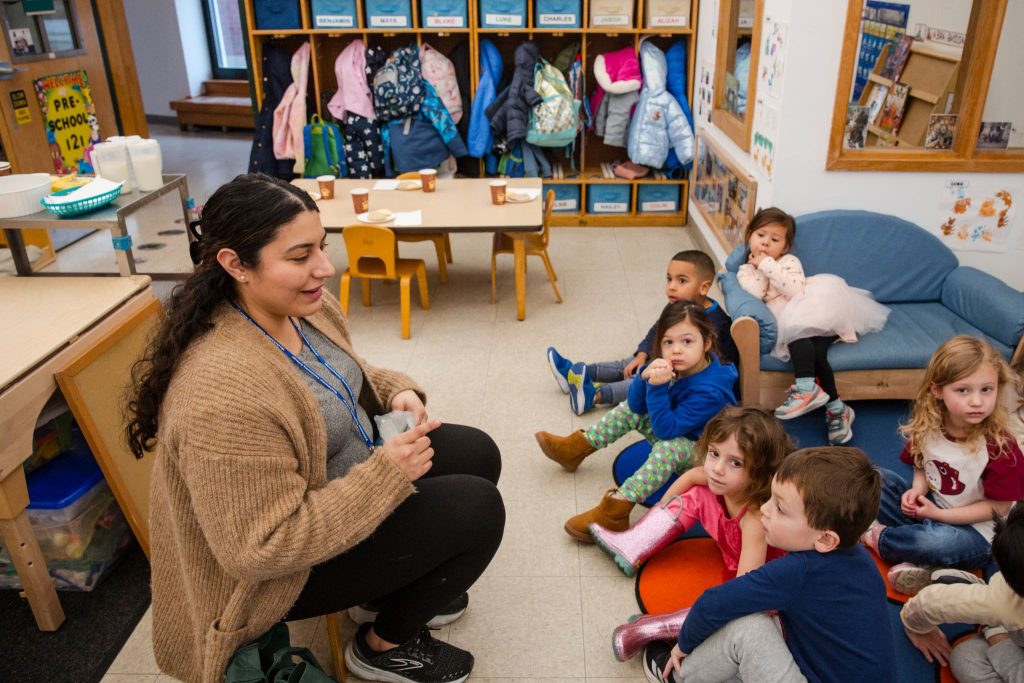
Dona Anderson, the Institute’s executive director, testified at the New York State Office of Children and Family Services public hearing on May 10, 2024, regarding New York State’s proposed three-year plan to receive assistance under the Social Security Act and the Child Care and Development Block Grant (CCDBG) Act of 2014, also known as the Child Care and Development Fund. Read Ms. Anderson’s testimony:
Thank you for this opportunity to comment on the Child Care and Development Fund plan for New York State for FY2025—2027. My name is Dona Anderson and I am the executive director for the New York State Early Childhood Professional Development Institute at the City University of New York. The Institute is the implementing agency for the Aspire Registry, New York’s early childhood workforce registry; QUALITYstarsNY, the state’s Quality Rating and Improvement System for early childhood programs; and regional Early Childhood Career Centers across the state. We are proud to work alongside the Office of Children and Family Services as we work toward strengthening New York’s early care and learning workforce and supporting program quality.
Research shows that high-quality early learning experiences can have major impacts on a child’s healthy development — both at a young age and throughout their life. We support the state’s efforts to expand access to high quality child care through the Child Care Deserts Grant, and we are pleased to have enrolled nearly 450 desert grant recipients in our QUALITYstarsNY program. QUALITYstarsNY now has almost 2,000 participating programs, serving more than 85,000 young children in our state. As the CCDF plan rightly notes, sustaining the investment that QUALITYstarsNY received through federal pandemic funding is crucial to ensuring that early care and learning programs continue to receive the resources and support they need and deserve.
Expanding access to child care programs in New York State also means building and strengthening a robust workforce that is prepared with the knowledge, competencies and skills they need to care for young children. We commend OCFS’s investment in professional development through the Educational Incentive Program, which grants scholarships to child care providers for training and coursework. Since 2021, the Institute’s Early Childhood Career Development Center has supported more than 2,000 students receiving EIP scholarship funding. The Career Development Center’s advisors also serve thousands of clients across New York State with other services, providing them with advisement on career pathways and certification and degree options at no cost. These services are essential — both to recruit new professionals to the field and to provide dedicated educators with the means and opportunity to advance in their careers.
We also commend the state’s efforts to provide high-caliber professional learning experiences to early care providers. The Aspire Registry’s quality assurance review of professional development aims to verify and recognize quality training opportunities provided by more than 2,225 registered trainers across the state. It also gives providers the ability to maintain accurate, validated records of their professional training and find high-quality trainings through the Registry’s PD Finder.
We appreciate the CCDF plan’s vision for a “skilled child care workforce with adequate compensation and benefits.” As the CCDF plan highlights, data from the Aspire Registry represents an essential profile of New York’s early childhood workforce, giving us important insight into the needs of child care providers. An Aspire Registry member’s profile reflects an individual’s years of experience and the certifications, degrees and credentials they have earned. The Registry allows early childhood caregivers and educators to plan and track their professional growth — a critical measure for successful career advancement. Recognizing and fairly compensating early care professionals for their effort, education, and professional development is an important step toward elevating the early childhood profession.
Caring for and educating young children is important work. We support the state’s initiatives to bolster compensation and professional growth opportunities for the early care and learning workforce, and we look forward to continuing our work together to serve early childhood educators and professionals.
Thank you for your time.


